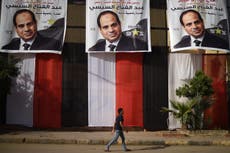For young Egyptians, Sisi's kite ban is their first taste of an oppressive regime
The recent ban is only the latest instalment in a series of peculiar measures concocted by an exceedingly paranoid Egyptian government
When the Egyptian government shuttered schools to combat the spread of coronavirus in mid-March, it was intended as a temporary measure, but, with coronavirus cases increasing across the country, schools never reopened. Many young Egyptians who would have otherwise been in school began taking up new pastimes, and, for months, the Cairo skyline has been dotted with kites.
New economies sprung up around the Egyptian kite fad, complete with kite competitions, artisan kite designers, and street vendors hawking the toy to drivers on major thoroughfares. The Egyptian media embraced the phenomenon when it began, and popular outlets published everything from kite-centric photo essays to do-it-yourself guides for crafty readers who wanted to fashion a kite at home.
In June, however, Egyptian media changed its tune. Outlets began reporting on tragic accidents and even crimes attributed to kiting.
On 15 June, state-owned newspaper Al-Ahram reported that two children in the Beheira Governorate were fatally electrocuted when they tried to retrieve their kite from where it was tangled with a light pole. Al-Ahram also wrote that an unnamed man had lured another man to an industrial zone on the outskirts of Alexandria under the guise of hunting for scraps to make kites, only to rob and then murder him. Al-Youm Al-Sabea, which ran an encouraging how-to-make-a-kite-at-home guide back in May, reported on 4 July that a child had been struck by a vehicle while flying a kite in an unspecified city. The writer called the recent prevalence of kites in Egypt a “kite disaster”.
The shifting narrative in the press mirrored conversations happening in parliament. Parliamentarian Khaled Abu Talib, a member of the defence and security committee, first raised the issue of kites on 24 June, when he warned that kites presented a threat to national security. If a person fitted their kite with a hidden camera, he reasoned, it could be flown like a drone, which are only permitted in Egypt with a special permit, and used to gather intel on sensitive military installations. Many Egyptians following these developments could guess what was coming next.
On 9 July, the governor of Alexandria announced a directive banning the flying of kites. A similar ban has yet to be formally announced in Cairo, but police began confiscating and destroying kites in the capital city the next day, nonetheless. Adults and the parents of minors caught flying kites can now face fines of up to 1,000 EGP (£49), and police have already confiscated hundreds of kites in Cairo and Alexandria.
The recent ban on kites is only the latest instalment in a series of peculiar measures concocted by an exceedingly paranoid Egyptian government. But, for President Sisi, who is intent on quashing popular movements and maintaining his sweaty clutch on power, even relatively benign crackdowns like this one serve a larger purpose. Because kiting is popular mostly among children and young people, the kite ban and its enforcement will serve as the first introduction for many to the tactics of an oppressive Egyptian regime. For Sisi and his state security apparatus, the ban represents an opportunity to make an early and lasting impression on young Egyptians who, unlike their elder siblings and parents, have not yet grown jaded from unfinished revolution, sham elections, and regular crackdowns on personal freedoms.
As the ban on kites in Alexandria and Cairo enters its third week, it remains unclear whether it will lead to any significant reduction in accidents and injuries. Although, in cities already known for failing infrastructure and frequent traffic accidents, it seems unlikely. What is likely, however, is that the ban will serve a more nefarious purpose of conditioning young people to the overbearing reach of a regime determined to keep Egyptians under its thumb.
The current kite ban might not be enough to pre-empt the next popular uprising, but, for President Sisi, it’s worth a shot.
M Beaumont is a pseudonym





Join our commenting forum
Join thought-provoking conversations, follow other Independent readers and see their replies